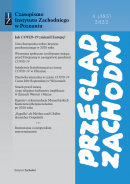Strach przed zarazą i jego religijno-kulturowe implikacje w dziejach Warmii i Mazur
Fear of the plague and its religious and cultural implications in the history of Warmia and Masuria
Author(s): Marek JodkowskiSubject(s): Local History / Microhistory, Social history
Published by: Instytut Zachodni im. Zygmunta Wojciechowskiego
Keywords: cholera; plague; fear; Warmia and Masuria
Summary/Abstract: The article deals with the fear that manifested itself in the history of Warmia and Masuria. Its particular significance was evident when confronted with the plague, which spread easily, decimating the local population. Panic manifestations were observed especially during the plague and cholera epidemics. The lack of proper recognition of the disease generated erroneous control decisions, which exacerbated negative attitudes among local communities. Extraordinary circumstances led to the disruption of traditional rhythms of life and customs,especially regarding the handling of the sick and the dead. The plague, interpreted in a religious spirit, was associated with punishment sent by God. In order to propitiate or atone for it, shrineswere founded, vows were taken, pilgrimages were made, processions were initiated, and chapels and crosses were erected. The authors of several monographs that dealt with these problems focused on the course of the epidemic, the ordinances of state authorities, and methods of treatment, especially in the perspective of the medical knowledge of the time. These publications, however, treated the issue of fear that accompanied the spread of the plague merely marginally. The research method is an analysis of the existing literature on diseases in order to demonstrate the importance of fear as an efficient cause in the history of the community.
Journal: Przegląd Zachodni
- Issue Year: 385/2022
- Issue No: 04
- Page Range: 85-96
- Page Count: 12
- Language: English, Polish

